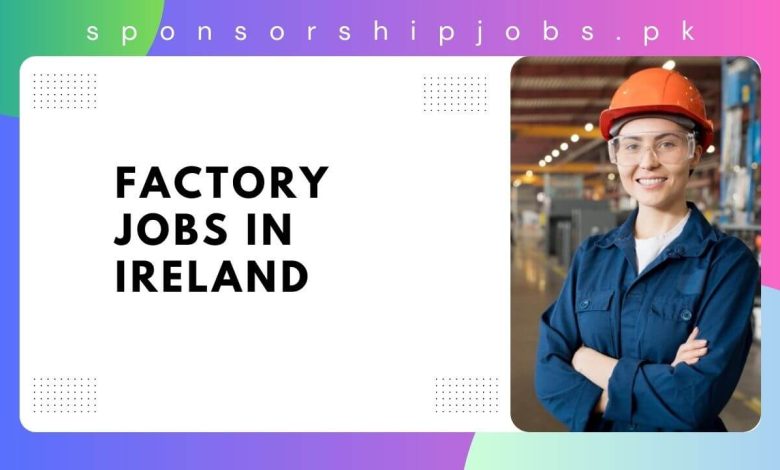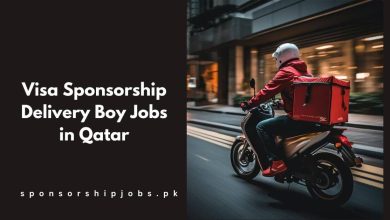Factory Jobs in Ireland With Visa Sponsorship 2025

Working in Ireland offers international employees numerous opportunities and extraordinary advantages. First and foremost, they have the opportunity to work in a welcoming environment that offers visa sponsorship opportunities. Would you like to acquire additional information regarding these benefits? Learn more about factory positions in Ireland with visa sponsorship by continuing to read.
Employment opportunities in Ireland are expanding, and aspiring foreigners can contribute to its accelerated growth through visa sponsorship. To guarantee optimal output and fill vacancies, numerous service-providing sectors in Ireland require experienced manufacturing workers.
This essay will focus on the numerous factory positions in Ireland that are available with visa sponsorship. Additionally, we will examine the numerous job search sites available for factory employment in Ireland and discuss the benefits of working there as a foreigner. However, we must first examine the Irish talent shortage and the measures the Irish government is implementing.
Check Also: Visa Sponsorship Jobs in Ireland – Work Visa
Ireland and the Labor Shortage Saga:
Ireland is a breathtaking island nation in Western Europe, boasting a rich cultural heritage and majestic natural beauty. Ireland is a well-liked tourist destination for both domestic and international visitors. Additionally, Ireland’s moderate rainfall and precipitation, in conjunction with its warm temperatures, render it an appealing destination for both tourists and international employees.
Furthermore, Ireland, like the United Kingdom, experiences temperate temperatures; however, the weather can fluctuate significantly within a matter of hours. Nevertheless, Business News’ precise portrayal of a diminutive yet potent nation will become apparent as you gain a more profound understanding of Ireland.
The labor shortage of competent employees remains a serious concern, despite the increasing migration of foreigners to Ireland, which now accounts for 12% of the overall population.
Furthermore, the Manpower Group employment portal conducted a survey that revealed that “Four in five Irish companies are experiencing difficulty in attracting talent, as Ireland is currently experiencing its most severe talent shortage in 17 years.” As an intervention, the Irish government has made visa sponsorship jobs accessible to attract talented foreigners to fill these unfilled positions, which include factory work with visa sponsorship.
The necessity for a significant number of employment opportunities for foreigners to fill these vacancies is a direct consequence of the qualified labor shortage. Consequently, the following is a compilation of factory employment opportunities in Ireland that are eligible for visa sponsorship. What are these positions, and what are the responsibilities of factory workers? In the subsequent section, we will delve into the matter.
What are Factory jobs?
A manufacturing facility executes factory tasks. It could be an industrial facility or a construction site. Consequently, these roles necessitate that individuals possess a specific skill that is pertinent to the assignment.
Additionally, factory workers may be required to perform various employment functions within the plant. This may include product assembly and packaging, as well as sorting and inspecting items after they are made.
Occupations in these categories are classified as factory occupations.
- These sectors include the pharmaceutical and leather industries, manufacturing industries, beverage and dairy processing industries, among others.
- The construction industry
These industries constitute a substantial portion of Ireland’s total industrial sector.
Moreover, the industrial breakdown of companies in Ireland revealed the following interesting facts:
- The construction industry is comprised of more than 30,311 enterprises.
- 17,170 enterprises are part of the Manufacturing Industry. In total, 351,616 companies are registered.
Consequently, this serves as an illustration of Ireland’s employment potential in the capacity to occupy positions at these manufacturing and construction facilities.
Job Role of Factory Workers in Ireland:
The employment functions of manufacturing laborers are subject to industry-specific variations, as previously mentioned. Moreover, manufacturing labovariousrequired to perform a variety of tasks at varying times, contingent upon the nature of their position.
Nevertheless, Indeed magazine specifies that certain general responsibilities or activities of a factory worker include
- Acquiring items immediately upon their production for packaging
- Engaging in the production of machinery
- Perform quality control tests on products to confirm that they are in complete compliance with the specified measure.
- Arrange the products that have been completed and distinguish the ones that have been damaged to facilitate their collection
- The job involves assembling the product and packaging it for storage or distribution.
- Inspect the finished product to guarantee that it is properly packaged and stored.
- Guarantee that the production process is conducted in a hygienic environment.
- Provide employees with a safe and healthy work environment by maintaining the cleanliness of work areas.
- Manage automated systems and apparatus to optimize output and outcomes.
These are merely a few of the fundamental obligations of industrial laborers, and as previously mentioned, they may vary slightly depending on the industry. Therefore, you must conduct your research before submitting your application. Given this, it is imperative to review the fundamental competencies that are essential for success in this field.
Basic Skills for Factory Workers:
The following are some fundamental skills and expertise that are required to secure a factory job in Ireland with visa sponsorship, as per National Careers:
- You will need certain physical capabilities, including the ability to manage affairs and exertion.
- Possess a high attention span and be detail-oriented.
- Be an effective colleague.
- Effective communication with managers and colleagues
- The capacity to organize and execute assignments
- I have the capacity to operate and regulate a variety of apparatus at all times.
- Flexibility to accommodate a variety of workstations
- Be receptive to new ideas and corrections.
- Capacity to learn on the job and multitask The ability to produce and process a variety of products in response to an increase in demand is also crucial.
These are essentially general transferable skills that are necessary for employment in a factory in Ireland with visa sponsorship.
Benefits of Factory Jobs in Ireland:
- Competitive Wages: Factory jobs in Ireland frequently provide competitive wages, particularly in light of the relatively high cost of living in the country. Additionally, numerous factories offer overtime opportunities, which can substantially increase earnings.
- Employment Stability: The manufacturing sector in Ireland is both robust and diverse, encompassing industries such as pharmaceuticals, electronics, food processing, and medical devices. This diversity ensures a consistent demand for factory laborers and job stability.
- Health and Safety Standards: To guarantee the safety of laborers in industrial settings, Ireland has implemented rigorous health and safety regulations. This dedication to safety reduces the likelihood of workplace accidents and injuries.
- Comprehensive Benefits: Employees in factory positions frequently receive health insurance, retirement plans, paid medical leave, and vacation days.
- Career Advancement: Numerous factories provide training programs and opportunities for career advancement. With the acquisition of additional training and experience, employees may advance to supervisory or managerial roles.
- Skill Development: Factory employment offers the chance to acquire and refine various skills, including logistics and production management, as well as the operation of machinery and quality control.
- Work-Life Balance: Numerous factories operate on a shift basis, which can offer flexibility and enable employees to reconcile their professional obligations with their personal and familial obligations.
- Economic Contribution: Employment in the manufacturing sector is a substantial contributor to the Irish economy, fostering a sense of pride and accomplishment.
- Diverse Workforce: Factory jobs in Ireland are characterized by a diverse workforce, which offers the chance to collaborate with individuals from various origins and cultures, thereby improving the overall work experience.
- Job Opportunities: Due to the consistent demand for factory workers, there are frequently numerous job openings available, which makes it relatively simpler to secure employment in this industry.
- Legal Protections: Irish labor laws safeguard the rights of workers by guaranteeing equitable treatment, non-discrimination, and the right to a safe working environment.
- Community and Support: Numerous factories cultivate a robust sense of community among their employees, utilizing team-building activities and support networks to improve job satisfaction.
- Quality of Life: Ireland is renowned for its vibrant culture, stunning landscapes, and exceptional quality of life. These advantages are accessible to personnel who work in Ireland.
- Educational Opportunities: Certain factories provide educational assistance programs to assist employees in pursuing additional education and training, which can result in career advancement.
- Modern Facilities: Numerous factories in Ireland are outfitted with contemporary technology and amenities, which guarantee a productive and comfortable work environment.
- Environmental Commitment: Ireland prioritizes sustainability, and numerous factories implement environmentally favorable procedures that enable employees to contribute to environmental conservation initiatives.
- Labor Union Representation: In the manufacturing sector, employees frequently have the opportunity to join labor unions, which offer them additional support and resources and advocate for their rights.
- Relocation Assistance: Certain factories provide relocation assistance to international workers, which includes locating housing and integrating into the local community.
- Access to EU Benefits: Working in Ireland grants access to various benefits that are associated with membership in the European Union, such as the ability to travel and work freely within the EU.
- Job Satisfaction: A significant number of factory workers derive satisfaction from participating in the production process, which enables them to contribute to the development of products that are utilized both domestically and internationally.
What are Visa Sponsorship Jobs?
As you may have hypothesized, visa sponsorship positions are employment opportunities that are contingent upon visa sponsorship. Quite simply, your visa application is entirely the responsibility of your employer or organization in terms of financial and legal responsibility.
This implies that specific occupations offer specific advantages, and all that is necessary is to submit an application to an organization that qualifies and fulfills the job specifications. As a result, the organization automatically designates you as a sponsor for your visa, including the legal financial obligation.
Skilled and unskilled immigrants are eligible for a variety of employment opportunities with visa sponsorship in Ireland, including factory positions.
Visa Sponsorship Factory Jobs in Ireland:
Based on Indeed, Glassdoor, and Talents, the following is a compilation of the most prevalent factory positions in Ireland, as well as the anticipated annual average wage.
- Factory Cleaner
- Average salary: € 23 985 per year or € 12.30 per hour (Talents)
- Factory Electrician
- Average Salary: € 52 500 per year or € 26.92
- Factory operation Lead
- Average salary: € 42 500 per year or € 21.79 per hour.
- Factory Manager
- Average Salary: €99,247 per year
- Visual Merchandiser
- Average Salary: €37565 per year
- Project worker
- Average Salary: €34,989; per year or €18.02 per hour.
- Production operator
- Average Salary: € 29,000 per year or € 14.87 per hour
- Production Associate
- Average salary: €14.30 per hour
- Machine Operator
- Average salary: €31,200 per year
- Production Worker
- Average salary: €34,202 a year and €16 an hour
- Assembler
- Average salary: € 29 250 per year or € 15 per hour.
- Packer
- Average salary: €13.01 per hour
- Logistic manager
- Average Salary: €62,835 per year
- Manufacturing operator
- Average Salary: €40,833 a year and €20 an hour
- Manufacturing team member
- Average salary: €37,252 per year
- Warehouse Operator
- Average Salary: € 26 280 per year or € 13.48 per hour
- Production operator Packaging
- Average salary: €99,247 per year
- Factory Manager
- Average salary: €99,247 per year
- Industrial Cleaning Operative
- Average Salary: € 23,985 per year or € 12.30 per hour
These are only a few of the most common factory occupations in Ireland that necessitate a visa. Nevertheless, certain occupations, such as those in the pharmaceutical industry, may be sector-specific. Consequently, the responsibilities of these positions may differ significantly depending on the industry.
How to Apply for Factory Jobs in Ireland?
Step-by-step instructions for applying for a factory job in Ireland with visa sponsorship are provided below:
1. Get a Job Offer
The initial step in securing visa sponsorship in Ireland is to secure a job offer from a qualified employer who provides visa sponsorship to non-EEA nationals. Once you have received an official job offer, you may proceed with your work permit application.
However, it is important to note that not all individuals are required to obtain a visa sponsorship to work in Ireland. Additionally, individuals from Switzerland, the European Economic Area, the European Union, and the United Kingdom are not required to obtain a visa to work in Ireland. Consequently, if you are a national of a non-EEA nation, which is a country apart from the EU, Switzerland, or the United Kingdom, you are required to apply for a work permit—an employment work permit.
2. Apply for an Employment Work Permit
In Ireland, various work permits are available to qualified foreign nationals. Nevertheless, the most prevalent are
- Critical Skills Employment Permit: This permit is designed for professionals who possess exceptional professional skills in the following fields: engineering, IT, science, health care, and research.
- General Employment Permit: Individuals who submit applications for positions that are not on the list of specialized occupations or ineligible occupations are granted the General Employment Visa. If you are applying for a factory position with visa sponsorship, the general employment visa permit is the most suitable option.
- Dependent Partner Employment Permits: This permit is designed for applicants who have a family member who is employed in Ireland and possesses essential skills.
3. Begin the Application Process
The application process may commence once you have determined the most suitable visa permission for your journey, such as the general employment permit in this case.
To do so, go to the Employment Permits Online System (EPOS) application page and fill out the form.
Required Documents:
- A passport that has been verified
- Proof of official employment
- Employer and sponsor information
- Your full name, age, height, and any other relevant information
- Please provide a copy of your statement or SOP that explains the rationale behind your journey.
- Verification of financial statements
- Details concerning your anticipated compensation
- Please provide detailed information regarding your employment.
4. Submit your Application
Before submitting your registration, you will be obligated to pay an application fee. Do a cross-check once you have uploaded the relevant document to eliminate any possible mistakes or inconsistencies. Once certified, you can proceed with the submission.
Please be advised that you are required to submit an application for an employment permit at least 12 weeks prior to the commencement of your anticipated employment.
Websites to find Visa Sponsorship Factory Jobs in Ireland:
- Linkedin Ireland
- Irishjobs
- Glassdoor
- Monster
- Indeed
- Jooble
- Simply hired
- Careerjet
- Reeds
Best Recruitment Agencies In Ireland for Visa Sponsorship Jobs:
The process of applying for visa sponsorship in Ireland can be challenging, particularly when considering the job search process on various job search portals. To facilitate the procedure, it is possible to collaborate with a registered recruitment agency in Ireland. They assist you in completing challenging duties.
The foremost recruitment agencies in Ireland that specialize in visa sponsorship are as follows:
- Approach People Recruitment
- Storm Recruitment
- Action Recruitment
- Ward Personnel
- Allen Recruitment
- Clark
Conclusion:
You can relocate to Ireland with a general employment permit and an official job offer, as factory positions do not necessitate any special skills. We have provided top-tier industrial positions in Ireland through visa sponsorship and the numerous types of visa permits that are available for foreign laborers. Therefore, we trust that this information will help you make the most informed decision regarding your career advancement.
Frequently Asked Questions:
-
Who is eligible to work in Ireland?
If you are an Irish or a European citizen, you have an automatic right to live and work in Ireland. If you are not from the European Union or Iceland, Liechtenstein, Norway, or Switzerland, you will likely need a special employment permit to work in Ireland.
-
Can I directly apply for a job in Ireland?
If you are not from the EEA, Switzerland, or the UK, you must have permission to live in Ireland. To get permission to come to Ireland to work, you have to apply for an employment permit. In general, you must get your employment permit before you come to Ireland.
-
How much does a factory worker earn in Ireland?
The average factory worker’s gross salary in Ireland is €32,043, or an equivalent hourly rate of €15. In addition, they earn an average bonus of €401. Salary estimates are based on salary survey data collected directly from employers and anonymous employees in Ireland.



